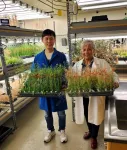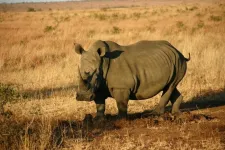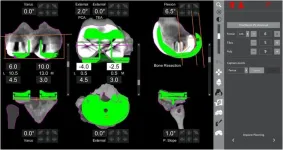(Press-News.org) Scientists have known about a particular organelle in plant cells for over a century. However, UC Riverside scientists have only now discovered that organelle’s key role in aging.
The researchers initially set out to understand more generally which parts of plant cells control plant responses to stress from things like infections, too much salt, or too little light. Serendipitously, they found this organelle, and a protein responsible for maintaining the organelle, control whether plants survive being left too often in the dark.
Because they had not expected this discovery, which is described in a Nature Plants journal article, the research team was thrilled.
“For us, this finding is a big deal. For the first time, we have defined the profound importance of an organelle in the cell that was not previously implicated in the process of aging,” said Katie Dehesh, distinguished professor of molecular biochemistry at UCR and co-author of the new article.
Sometimes described as appearing like a stack of deflated balloons or some dropped lasagna, the organelle called the Golgi body is composed of a series of cup-shaped membrane-covered sacs. It sorts various molecules in the cell and ensures they get to the right places.
“Golgi are like the post office of the cell. They package and send out proteins and lipids to where they’re needed,” said Heeseung Choi, a researcher in UCR’s Botany and Plant Sciences Department and co-author of the new study. “A damaged Golgi can create confusion and trouble in the cell’s activities, affecting how the cell works and stays healthy.”
If the Golgi is the post office, then the COG protein is the postal worker. This protein controls and coordinates the movement of small sac “envelopes” that transport other molecules around the cell.
Additionally, COG helps Golgi bodies attach sugars to other proteins or lipids before they are sent elsewhere in the cell. This sugar modification, called glycosylation, is crucial for many biological processes, including immune response.
To learn more about how COG affects plant cells, the research team modified some plants so that they could not produce it. Under normal growing conditions, the modified plants grew just fine, and were indistinguishable from unmodified plants.
However, depriving plants of light means plants are unable to make sugar from sunlight to fuel growth. When exposed to excessive darkness the leaves of the mutant, COG-free plants began to turn yellow, wrinkled, and thin — signs the plants were dying.
“In the dark, the COG mutants showed signs of aging that typically appear in wild, unmodified plants around day nine. But in the mutants, these signs manifested in just three days,” Choi said.
Reversing the mutation and returning the COG protein back into the plants rapidly brought them back to life. “It’s like nothing happened to them once we reversed the mutation,” Dehesh said. “These responses highlight the critical importance of the COG protein and normal Golgi function in stress management,” Choi added.
Part of the excitement surrounding this discovery is that humans, plants, and all eukaryotic organisms have Golgi bodies in their cells. Now, plants can serve as a platform to explore the intricacies of the Golgi's role in human aging. For this reason, the research team is planning further studies of the molecular mechanisms behind the results from this study.
“Not only does our research advance our knowledge about how plants age, but it could also provide crucial clues about aging in humans,” Dehesh said. “When the COG protein complex doesn't work properly, it might make our cells age faster, just like what we saw in plants when they lacked light. This breakthrough could have far-reaching implications for the study of aging and age-related diseases.”
END
Keys to aging hidden in the leaves
Discovery brings nearly dead plants back to life
2024-01-17
ELSE PRESS RELEASES FROM THIS DATE:
Rain can spoil a wolf spider’s day, too
2024-01-17
If you hate the rain, you have something in common with wolf spiders.
Researchers at the University of Cincinnati found that wolf spiders can’t signal others or perceive danger from predators as easily on rain-soaked leaves compared to dry ones. Even communicating with would-be mates is harder after it rains.
The study was published in the Journal of Insect Behavior.
Biologists in UC’s College of Arts and Sciences studied Schizocosa ocreata, a wolf spider found across much of the United States. Males respond to chemical signals from females by using a combination of visual ...
Independent dispute resolution of no surprises act financially unviable for radiology
2024-01-17
Leesburg, VA, January 17, 2024—According to the American Journal of Roentgenology (AJR), the No Surprises Act’s (NSA) independent dispute resolution (IDR) process would be financially unfeasible for a large portion of out-of-network (OON) claims for hospital-based specialties—more so for radiologists than other specialists.
“Although the NSA enacted important patient protections, IDR fees limit clinicians’ opportunities to dispute payer-determined payments and potentially undermine their bargaining power in contract negotiations,” ...
AMS presidential forum to address “Climate Science as Service to Society”
2024-01-17
[Boston, MA—January 17, 2024] The American Meteorological Society (AMS) will open its 104th Annual Meeting with a Presidential Forum on how to advance society’s acceptance and use of climate science. Distinguished atmospheric scientist Dr. Kerry Emanuel will moderate a “fireside chat” with Monica Medina, President and CEO of the Wildlife Conservation Society and former Deputy Assistant Secretary at the State Department, and Bob Inglis, Executive Director of RepublicEn.org and former congressman from South Carolina. The Forum, with opening remarks by AMS President ...
Researchers find anti-HIV drugs may prevent complications from bacterial sepsis
2024-01-17
Bacterial infections can lead to the formation of abscesses — pockets of dead cells and debris surrounded by inflammatory immune cells. Bacteria multiply within abscesses, causing more inflammation and further damage to surrounding tissues. In severe cases, these immune reactions spread across the body, resulting in life-threatening organ failure, or sepsis. But how these abscesses form and what can be done to prevent them were previously not well understood.
Using preclinical models, investigators from Brigham and ...
The heat is on: UMass Amherst scientists discover southern Africa’s temps will rise past the rhinos’ tolerance
2024-01-17
January 17, 2024
The Heat is on: UMass Amherst Scientists Discover Southern Africa’s Temps Will Rise Past the Rhinos’ Tolerance
New research shows that rising temperatures caused by climate change are impacting the remaining black and white rhinoceros populations on the African continent, suggests taking steps to mitigate impact now
AMHERST, Mass. – Southern Africa contains the vast majority of the world’s remaining populations of both black and white rhinoceroses ...
Next generation spinal fusion goes "meta"
2024-01-17
A civil engineer at the University of Pittsburgh is applying his expertise in bridges and infrastructure to develop new materials that better treat spinal injury, repair, and recovery. Amir Alavi’s proposal received a $557,000 boost from the National Institutes of Health to test the first “metamaterial” orthopedic implants.
With an estimated 342,000 procedures per year in the U.S.1, interbody spinal fusion is a popular procedure to treat a range of spinal pain and injuries, from herniated discs and degenerative diseases to trauma. Interbody fusion cages are spinal implants that are used in most of ...
Study identifies new findings on implant positioning and stability during robotic-assisted knee revision surgery
2024-01-17
HUNTINGTON, W.Va. - An innovative study at Marshall University published in ArthroplastyToday explores the use of robotic-assisted joint replacement in revision knee scenarios, comparing the pre- and post-revision implant positions in a series of revision total knee arthroplasties (TKA) using a state-of-the-art robotic arm system.
In this retrospective study, the orthopaedic team at the Marshall University Joan C. Edwards School of Medicine and Marshall Health performed 25 revision knee replacements with a robotic assisted computer system. The procedure involved placing new implants at the end of the thighbone and top of the shinbone with the computer's aid to ensure ...
New vaccine design uses immunity against influenza to offer faster protection against emerging pathogens
2024-01-17
RIVERSIDE, Calif. -- After COVID vaccination, it usually takes weeks for our bodies to develop protective antibody responses. Imagine, however, a vaccine that speeds up the production of antibodies against SARS-CoV-2, the virus that spreads COVID-19.
A research team led by Rong Hai, an associate professor of microbiology and plant pathology at the University of California, Riverside, has developed such a vaccine by using preexisting immunity to a separate virus (the influenza virus) to help kickstart the process of making antibodies ...
How do controllable risk factors for dementia vary by race, ethnicity?
2024-01-17
MINNEAPOLIS – Approximately 23% of people diagnosed with Alzheimer’s disease or another related dementia in their 60s and later have cases that can be explained by controllable risk factors such as high blood pressure, diabetes, physical inactivity, and too little or too much sleep, and that percentage varies depending on race and ethnicity, according to a new study published in the January 17, 2024, online issue of Neurology®, the medical journal of the American Academy of Neurology. When including APOE ε4, a gene variant associated with the strongest genetic risk for late-age Alzheimer’s disease, the study found about a third of cases could be explained ...
For people with migraine, feelings of stigma may impact disability, quality of life
2024-01-17
MINNEAPOLIS – Migraine can impact many aspects of a person’s life, but less is known about how feelings of stigma about the disease affect quality of life. For people with migraine, these feelings of stigma were linked to more disability, increased disease burden and reduced quality of life, according to new research published in the January 17, 2024, online issue of Neurology®, the medical journal of the American Academy of Neurology.
“Stigma is common where the disease is not readily apparent to others, and there is indication that it could be especially relevant for those living with migraine,” said study author Robert Evan Shapiro, ...
LAST 30 PRESS RELEASES:
This ancient plant-eater had a twisted jaw and sideways-facing teeth
Jackdaw chicks listen to adults to learn about predators
Toxic algal bloom has taken a heavy toll on mental health
Beyond silicon: SKKU team presents Indium Selenide roadmap for ultra-low-power AI and quantum computing
Sugar comforts newborn babies during painful procedures
Pollen exposure linked to poorer exam results taken at the end of secondary school
7 hours 18 mins may be optimal sleep length for avoiding type 2 diabetes precursor
Around 6 deaths a year linked to clubbing in the UK
Children’s development set back years by Covid lockdowns, study reveals
Four decades of data give unique insight into the Sun’s inner life
Urban trees can absorb more CO₂ than cars emit during summer
Fund for Science and Technology awards $15 million to Scripps Oceanography
New NIH grant advances Lupus protein research
New farm-scale biochar system could cut agricultural emissions by 75 percent while removing carbon from the atmosphere
From herbal waste to high performance clean water material: Turning traditional medicine residues into powerful biochar
New sulfur-iron biochar shows powerful ability to lock up arsenic and cadmium in contaminated soils
AI-driven chart review accurately identifies potential rare disease trial participants in new study
Paleontologist Stephen Chester and colleagues reveal new clues about early primate evolution
UF research finds a gentler way to treat aggressive gum disease
Strong alcohol policy could reduce cancer in Canada
Air pollution from wildfires linked to higher rate of stroke
Tiny flows, big insights: microfluidics system boosts super-resolution microscopy
Pennington Biomedical researcher publishes editorial in leading American Heart Association journal
New tool reveals the secrets of HIV-infected cells
HMH scientists calculate breathing-brain wave rhythms in deepest sleep
Electron microscopy shows ‘mouse bite’ defects in semiconductors
Ochsner Children's CEO joins Make-A-Wish Board
Research spotlight: Exploring the neural basis of visual imagination
Wildlife imaging shows that AI models aren’t as smart as we think
Prolonged drought linked to instability in key nitrogen-cycling microbes in Connecticut salt marsh
[Press-News.org] Keys to aging hidden in the leavesDiscovery brings nearly dead plants back to life






